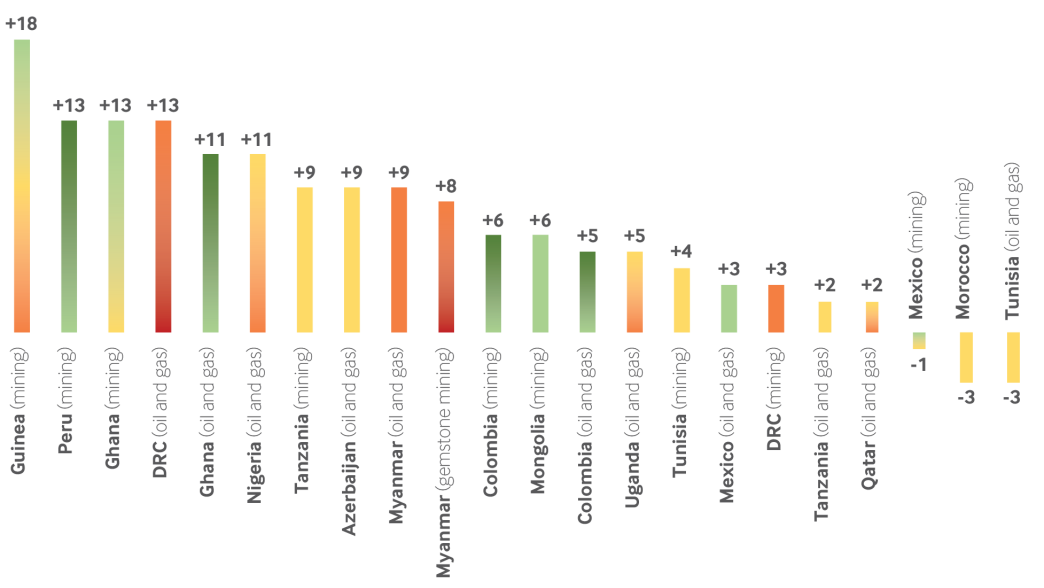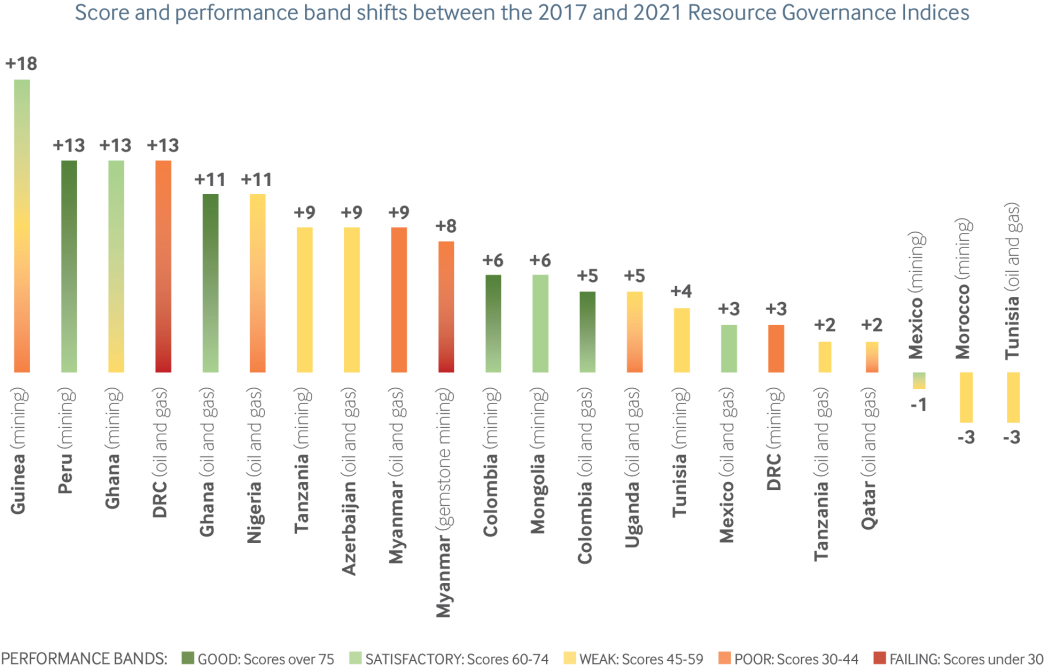
2021 Resource Governance Index
Français »
Español »
Read the press release.
Decisions about how the oil, gas and mining sectors are governed determine the wellbeing of the billion people living in poverty in resource-rich countries. Where policies and practices ensure informed, inclusive and accountable decision making, natural resources can enable fair, prosperous and sustainable societies, rather than undermine them.
The climate crisis, the coronavirus pandemic and dramatic changes in global energy markets have increased the stakes of good governance. Complex decisions about how to enable the political and economic adaptations necessary for a managed phaseout of fossil fuels and responsible increase in production of transition minerals sit at the heart of this dual crisis. Governance of the oil, gas and mining sectors will play a central role in the transition away from fossil fuels and the return to progress against poverty.
The Natural Resource Governance Institute (NRGI) produces the Resource Governance Index (RGI) as a diagnostic tool to measure the governance of oil, gas, and mining sectors in select countries and to highlight opportunities for policy and practice reforms at the global, regional and country levels.
The 2021 RGI assesses the governance of extractive sectors in 18 countries, including both established mineral and hydrocarbon producers, as well as new and prospective entrants to natural resource production.
Key messages:
Español »
Read the press release.
Decisions about how the oil, gas and mining sectors are governed determine the wellbeing of the billion people living in poverty in resource-rich countries. Where policies and practices ensure informed, inclusive and accountable decision making, natural resources can enable fair, prosperous and sustainable societies, rather than undermine them.
The climate crisis, the coronavirus pandemic and dramatic changes in global energy markets have increased the stakes of good governance. Complex decisions about how to enable the political and economic adaptations necessary for a managed phaseout of fossil fuels and responsible increase in production of transition minerals sit at the heart of this dual crisis. Governance of the oil, gas and mining sectors will play a central role in the transition away from fossil fuels and the return to progress against poverty.
The Natural Resource Governance Institute (NRGI) produces the Resource Governance Index (RGI) as a diagnostic tool to measure the governance of oil, gas, and mining sectors in select countries and to highlight opportunities for policy and practice reforms at the global, regional and country levels.
The 2021 RGI assesses the governance of extractive sectors in 18 countries, including both established mineral and hydrocarbon producers, as well as new and prospective entrants to natural resource production.
Key messages:
- Resource governance scores have improved in assessed countries over the last five years, but transparency and oversight gaps highlight pressing corruption and energy transition risks.
- Some of the worst governed areas of the extractive sector affect citizens’ lives the most, such as transparency and oversight of local environmental and social impacts.
- Countries strengthened both legal frameworks and their implementation over the last five years, but the gaps between policy and actual practice generally grew wider.
- Both governments and companies should prioritize measures to publicly disclose companies’ beneficial owners. Governments can strengthen laws on beneficial ownership transparency by targeting corruption risks, reducing legal ambiguities and requiring public disclosure. Governments and companies should more comprehensively disclose contracts.
- Many state-owned enterprises (SOEs) lack basic elements of corporate transparency and financial accountability. They should strengthen integrity measures and establish clear rules and disclosures on commodity sales.
- Citizen engagement is fundamental to a just and equitable energy transition. However, lack of transparency on oil price forecasts and demand scenarios, national oil company spending and emissions prevents citizens from knowing when authorities make risky bets on fossil fuels.
- Several countries with important reserves of critical minerals are unprepared for the coming boom. At the same time, countries should not lose focus on the governance of “traditional” minerals.
- Governments should improve resource governance by:
- Ensuring the implementation of sector laws, especially policies designed to counter corruption risks and negative local impacts associated with extraction.
- Improving oversight in areas of high corruption risk, such as licensing, SOE procurement and commodity trading.
- Ensuring transparency and accountability on climate risks and energy transition decision-making in relation to any extraction of fossil fuels and the exploitation of minerals needed for green technology.
- Protecting civic space, enabling citizens to demand and shape a just and equitable energy transition through dialogue and debate.
- 2021 Resource Governance Index: Azerbaijan (Oil and Gas)
- 2021 Resource Governance Index: Colombia (Mining)
- 2021 Resource Governance Index: Colombia (Oil and Gas)
- 2021 Resource Governance Index: Democratic Republic of Congo (Mining)
- 2021 Resource Governance Index: Democratic Republic of Congo (Oil and Gas)
- 2021 Resource Governance Index: Ghana (Mining)
- 2021 Resource Governance Index: Ghana (Oil and Gas)
- 2021 Resource Governance Index: Guinea (Mining)
- 2021 Resource Governance Index: Guyana (Oil and Gas)
- 2021 Resource Governance Index: Lebanon (Oil and Gas)
- 2021 Resource Governance Index: Mexico (Oil and Gas)
- 2021 Resource Governance Index: Mexico (Mining)
- 2021 Resource Governance Index: Mongolia (Mining)
- 2021 Resource Governance Index: Morocco (Mining)
- 2021 Resource Governance Index: Nigeria (Oil and Gas)
- 2021 Resource Governance Index: Peru (Mining)
- 2021 Resource Governance Index: Qatar (Oil and Gas)
- 2021 Resource Governance Index: Senegal (Mining)
- 2021 Resource Governance Index: Senegal (Oil and Gas)
- 2021 Resource Governance Index: Tanzania (Mining)
- 2021 Resource Governance Index: Tanzania (Oil and Gas)
- 2021 Resource Governance Index: Tunisia (Oil and Gas)
- 2021 Resource Governance Index: Tunisia (Mining)
- 2021 Resource Governance Index: Uganda (Mining)
- 2021 Resource Governance Index: Uganda (Oil and Gas)

